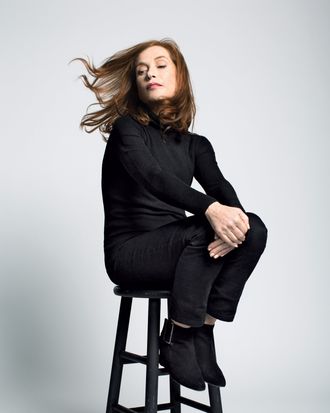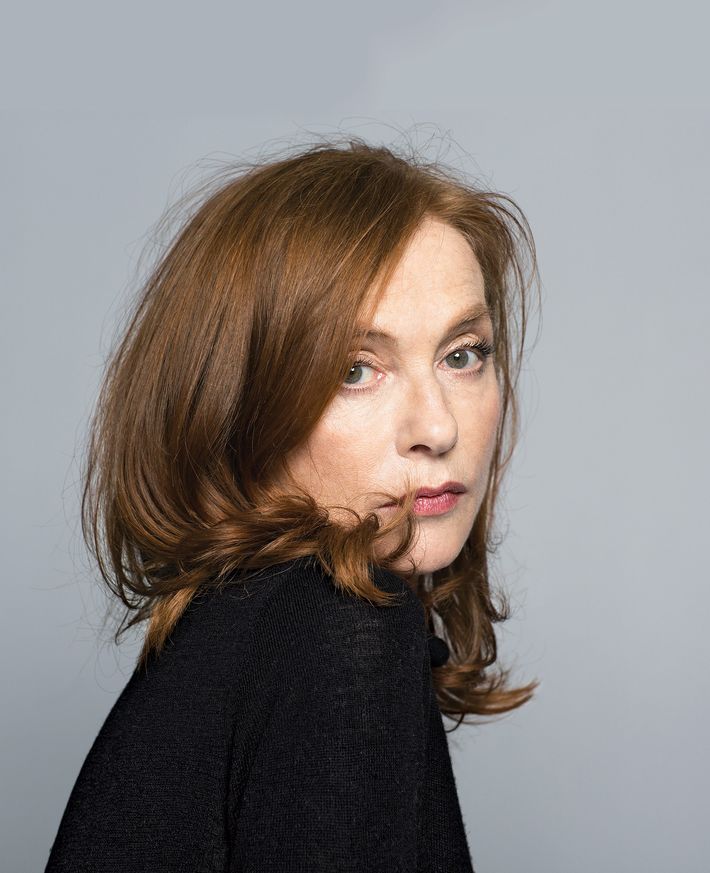
“I do not like the word challenge,” says Isabelle Huppert. Acting, she says, has always come naturally, like a language she was born already knowing how to speak. Over the course of her 45-year career, she has worked with legendary directors like Claude Chabrol, Jean-Luc Godard, and Michael Haneke, and she has won prizes at Cannes and at the BAFTAS, so it would not make that much sense to describe 2016 as her “breakthrough” year. And yet, somehow, it was. The double-whammy of Elle, a complicated and epically satisfying film by the Dutch director Paul Verhoeven, and Things to Come, a film as quiet and emotional as Elle is subversive, means that Huppert is now enjoying big visibility in America (never mind that both films are subtitled) and a following that is moving away from the fringe. (She remains, however, committed to intense theatrical work, including a production of Krzysztof Warlikowski’s Phaedra(s) at BAM last year that was described by one critic as “three hours of vomit, fellatio and menstruation.” But she likes the idea of being in a big Broadway blockbuster, too, should such a thing be offered. “I would love it!” she says, twinkling a bit. “Of course!”)
On a gray winter afternoon at the Mercer Hotel, Huppert looks 100 percent the part of the French film star in a tightly belted trench coat with big, sharp lapels, clicking across the lobby with her signature gait, which gives the impression that an invisible thread is pulling her ever forward by her slightly upturned chin. Huppert is small — five-foot-three — and very slight, and she moves with complete determination. There are no extraneous gestures or words; the impression she leaves is of the most self-actualized human being in the world.
The women Huppert has portrayed this year live very differently, and they address their obstacles with opposite methods, but they share some things: They both have cats, for one thing, and those cats, Huppert notes with one raised eyebrow, play big roles in their lives. They have to deal with being daughters and mothers simultaneously, and they have to deal with what it means to lose these needy, crazy mothers. But the main similarity is that they are not victims, even when very difficult things happen to them.
In the case of Elle, that difficult thing is explicitly violent: rape by a masked stranger in the opening scene. It’s a shocking and upsetting beginning to what turns out to be an often very funny film. Add to that the fact that the character’s reaction to the rape is multilayered, and includes an element of pleasure. It’s a complicated scenario to explore, but in the context of the (very, very French) film, it makes complete sense.
In Things to Come, the character Natalie, a high-school philosophy teacher, is left by her husband of 25 years in the weeks preceding her mother’s death, which is followed by an unceremonious dumping by her publisher.
“They react to what happens,” Huppert says of these characters, “and sometimes you expect them to collapse but they do not. Maybe I am speaking about myself: I have never known what I was going to do the day before I do it. I have never known what will happen,” Huppert continues. “Life is never predictable, and these women react out of curiosity and surprise because that’s what you do. Only fiction gives one the feeling that you know what is next. Only fiction says you are going to be happy all the time.” She purses her lips in a very French way as if to say, “Obviously.”

“I thought Elle would be more controversial,” she says, “particularly in the States, but I think it is not because it has integrity. She is strong, fearless, and solitary, yes, and she is generous, but she is mostly a very contemporary woman, having all these side stories, having to deal with the past and never complaining, always moving on.” She pauses. “But I think the film works because you are left to make your own interpretations and explanations. It really has multiple layers, like in life you can start with a comedy and end with a tragedy, you have darker moments and funny moments, it’s a roller coaster of course.”
It seems like an obvious statement: Life is not organized by emotional categories, so why is film? Why shouldn’t a Hitchcockian moment be followed by something truly sad and then by the wholly absurd? And why should a character’s motivations or positions always be pure or consistent or move toward some inevitable, relatable goal? It is, perhaps, Huppert’s supreme comfort with the discomforts of life that makes her so compelling to watch. It is even possible that for a certain, French-film-watching segment of American women, Huppert’s heroines are the perfect antidote to a year of nauseating pussy-grabbing public misogyny: They are self-possessed and forward-moving in the face of whatever hideous circumstances life delivers, able to handle road bumps with humor and grace and supreme unflappability. They cry when they need to, and are not above buying self-protective pickaxes when the occasion demands, but they are in control of their own lives, and it is both satisfying and inspiring to watch.
But Huppert doesn’t particularly want her characters to be gleaming aspirational figures. “I’m just obsessed with creating a feeling of reality. I only ever mean to make people believe it’s real,” she says, “and that takes great concentration, to be so immersed in the present time, which sounds very theoretical but it’s not. It’s very organic. It’s very direct: I read a movie script once, I don’t imagine a past or some backstory or something like that, just a fusion between myself and the character. That’s it. If you think too much, you will put in too many things.”
It is, clearly, a method that works, and Huppert’s main reason for being in town, for being in this large suite at the Mercer, where she must move aside a massive bottle of Champagne in a sweating bucket of ice before settling in to chat, is that she is on the American awards circuit this season, with a Golden Globes win and, if predictions prove correct, the very real possibility of an Oscar nomination, too. And even if the films are outside of mainstream genres, she is excited about the possibility of big, mainstream recognition.
“I try to stay in the middle distance, but of course I want to win!” she says, laughing. “Show me this person who does not want to win.”
*This article appears in the January 9, 2017, issue of New York Magazine. It has been updated to reflect Huppert’s Golden Globes win.

